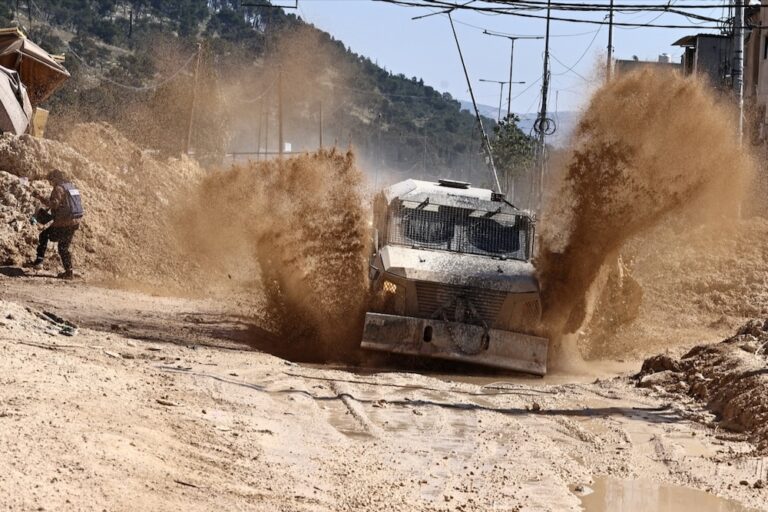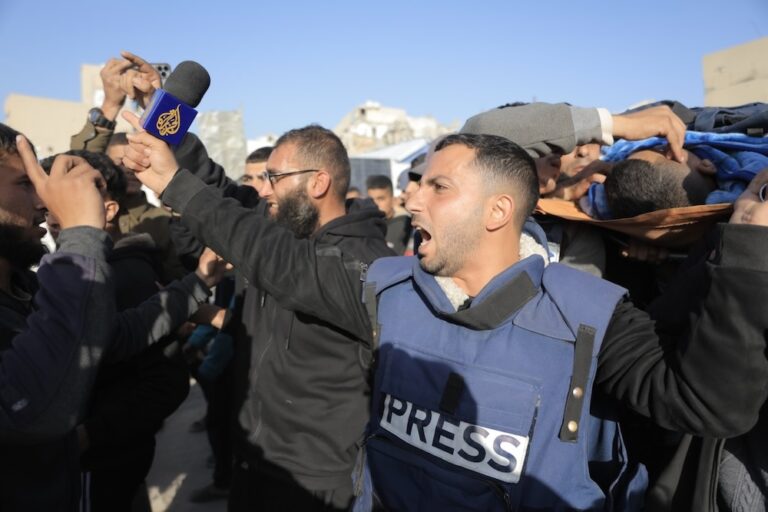(CPJ/IFEX) – The following is a 21 December 2001 CPJ press release: CPJ RESPONDS TO ISRAELI ARMY REPORT ON JOURNALIST SHOOTINGS December 21, 2001, New York-The Committee to Protect Journalists (CPJ) welcomes the Israel Defense Forces (IDF)’s new report on the issue of journalists wounded by gunfire while covering events in the West Bank and […]
(CPJ/IFEX) – The following is a 21 December 2001 CPJ press release:
CPJ RESPONDS TO ISRAELI ARMY REPORT ON JOURNALIST SHOOTINGS
December 21, 2001, New York-The Committee to Protect Journalists (CPJ) welcomes the Israel Defense Forces (IDF)’s new report on the issue of journalists wounded by gunfire while covering events in the West Bank and Gaza Strip over the past 14 months.
We are pleased by the IDF’s attention to this very serious issue. We also welcome the IDF’s stated commitment to ensuring the safety of journalists in the field, its expressed willingness to coordinate with the Israel-based Foreign Press Association (FPA), its pledge to improve methods by which journalists may report such incidents, and its stated efforts to increase troop awareness of the important role that journalists play in covering the conflict.
The report, a copy of which CPJ received on December 17, includes the IDF’s own accounting of several incidents in which journalists were injured by live gunfire or rubber-coated steel bullets since the Palestinian Intifada began in September 2000. The IDF Central Command ordered a review of these cases last summer, amid pressure from the FPA and international press freedom groups, including CPJ.
Regrettably, the IDF’s report fails to provide adequate explanations of incidents in which journalists were wounded by Israeli gunfire. The report provides only summary details of individual cases and leaves many questions unanswered.
The report claims that in several cases, the IDF was unable to provide more details due to the passage of time. But since last year, CPJ has repeatedly raised these and other cases with the IDF and the Israeli government. We must therefore concur with the FPA’s recent statement on the IDF report: “It is inexcusable that investigations should be dragged out for more than a year…The report says that better results were unattainable because of ‘the passage of time,’ and yet new incidents are not handled with any evident dispatch.”
Since September 2000, CPJ has documented over a dozen cases of journalists wounded by live rounds or rubber-coated steel bullets. Reporters Sans Frontières and other press freedom groups have documented several other such cases.
CPJ has repeatedly expressed its concern that in some of these cases, Israeli soldiers may have shot journalists deliberately (the IDF vehemently denies this accusation). At the very least, the IDF has acted recklessly, in many cases, by firing rounds that injured journalists.
The majority of these cases occurred in the first few months of the Intifada. The year 2001 has seen a welcome decline in journalist shootings in the occupied territories.
Summary accounting
Only in the case of Associated Press free-lance photographer Yola Monakhov has anyone in the IDF been disciplined for shooting a journalist. On November 11, 2000, Monakhov was struck in the lower abdomen by a live round fired by an Israeli soldier in the West Bank town of Bethlehem.
After a barrage of media criticism, the IDF formally apologized to Monakhov, stating that the soldier who fired the shot had violated IDF rules of engagement but had not targeted the journalist intentionally. According to the IDF report, the soldier’s commanding officer was reprimanded.
CPJ had hoped for a more vigorous and transparent investigation into these incidents in order to send a clear and unequivocal message to Israeli soldiers in the field that they must do everything possible to ensure the safety of journalists covering the Israeli-Palestinian conflict.
CPJ believes that to ensure impartiality, there should be a prompt independent investigation, outside the IDF, of all cases involving the shooting of journalists in the occupied territories. Soldiers or others found to have acted recklessly or criminally in injuring journalists must be disciplined or prosecuted, as the circumstances warrant.


